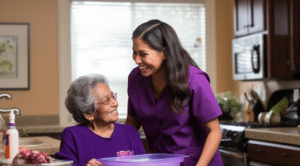
Thanks to telemedicine, seniors can now easily and effectively obtain healthcare services, particularly after a hospital stay. But managing virtual appointments can be difficult, particularly for those who are not tech-savvy. However, loved ones and home care can assist seniors with their telemedicine visits to ensure they follow their post hospital care plan requirements. This assistance helps reduce readmissions and makes sure that their recovery is on target.
Talk About Telemedicine Visits Early On
For some seniors, the telemedicine process might already be familiar, but during post hospital care, they may have more visits than ever before, which can be frustrating if the process isn’t one they particularly enjoy. On the other hand, if this will be the first time they’ve used the service, it’s good to spend some time introducing them to the technology they will be using prior to their first appointment.
In addition to giving detailed instructions on how to use the platform verbally, loved ones might also write down the instructions, particularly if there are times they won’t be with seniors during the appointments. This can decrease frustration if seniors forget a step as they try to log on.
When teaching them the basics of the platform, don’t forget to talk about camera usage, muting, and other basic steps. Loved ones can increase seniors’ confidence by helping them practice beforehand.
Check the Connection
There are still many places where a digital connection is spotty at best. It’s a good idea for loved ones to check seniors’ internet capabilities and ensure they have a reliable connection prior to agreeing to the post hospital care plan. If telemedicine appointments are still included in the plan, despite concern about connection, loved ones need to help seniors come up with a plan B.
For instance, can seniors use their phones for appointments rather than relying on their internet connection? Or can they be in a friend or family member’s home that might have a better connection? Having a fallback plan in case something goes wrong helps reduce seniors’ anxiety.
Make Sure Seniors Have the Right Technology
For successful telemedicine appointments, loved ones will need to make sure seniors have access to the devices they need for video chats, such as a computer, tablet, or smartphone with a camera and microphone. Additionally, when loved ones or home care can participate in the appointment, they can make sure seniors have documentation ready, including any symptoms they’ve noticed or questions they have about the post hospital care plan.
Promote Engagement
During telemedicine visits, loved ones should encourage seniors to participate actively with their healthcare provider. Invite them to share updates on their health, to raise any questions, and to express any preferences or worries they may have about the post hospital care plan.
Telemedicine can be a useful tool for seniors to obtain high-quality healthcare from the comfort of their homes following a hospital stay, provided they have the necessary support and preparedness. Loved ones and home care can ensure continuity of care and promote overall well-being by helping seniors navigate telemedicine sessions confidently and easily using these helpful tips.
If you or an aging loved one are considering Post Hospital Care in Palo Alto, CA, please contact the caring staff at Aviva In-Home Care today at (415) 463-1400
Aviva In-Home Care provides exceptional senior home care in the Bay Area, including San Francisco, Burlingame, San Mateo, Hillsborough, Atherton, Menlo Park, Palo Alto, Berkeley, Lafayette, Orinda, and surrounding areas.
- Keeping Seniors Properly Hydrated - June 6, 2025
- What You Should Know About Caring For A Parent With Alzheimer’s - May 23, 2025
- How To Help Your Senior Parent Feel Their Best Every Day - May 14, 2025




